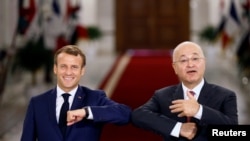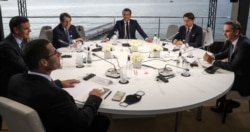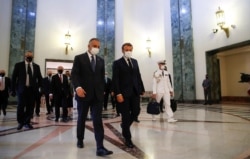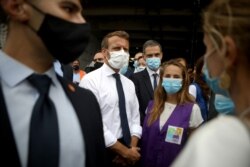After spending months fighting coronavirus fires at home, French President Emmanuel Macron has switched his sights to the Middle East, flying last week to two key regional hot spots, Lebanon and Iraq, and hosting a summit Thursday in Corsica partly dominated by southern Europe’s growing friction with Turkey.
Macron’s penchant for bold gestures, from dramatic announcements on climate change to hosting major meetings on global crises and prodding Europe on greater fiscal and military integration, have inevitably snagged international headlines. His latest Middle East foray is no different.
But opinions swing wildly about the president’s motives and tactics, with some suggesting he aims to reboot France’s Arab strategy, fill a void left by Washington, or simply keep a sharp eye out for French strategic and commercial interests. Still other observers warn against French neocolonialism or of Paris insufficiently engaging its European allies.
“What is Macron up to in the Middle East?” Egypt’s English-language Al Ahram weekly wrote on Tuesday, summing up a broader question raised by commentators.
Analyst Philippe Moreau Defarges, a former French diplomat, offers another take.
“He wants to forget what is happening in France,” where coronavirus cases are again soaring, Moreau Defarges said of Macron’s Lebanese efforts, in particular. “He wants to mobilize French public opinion around a great cause.”
Issues with Ankara
At Thursday’s summit outside the Corsican capital of Ajaccio, leaders from France and several other European Mediterranean states were to find a common European Union position on Turkey, Macron said, with differences sharp over a range of issues, including Turkey’s hydrocarbon exploration in waters claimed by Greece.
The bloc’s relationship with Ankara is also expected to dominate an EU summit later this month.
NATO members France and Turkey have also clashed on other issues, including Libya and Syria, with Turkey’s foreign minister recently calling Macron “hysterical.”
But a Thursday editorial by the regional newspaper Ouest-France offered a different take on the matter, as it praised Macron for his leadership.
“At another time, Washington would have shown diplomatic activism to reduce tensions between Turkey and Greece,” the regional daily wrote. With that not happening, it added, “the Europeans are on the front lines.”
Solo strategy?
In Iraq, too, Macron’s first official visit to Baghdad last week came just ahead of Washington’s long expected announcement of a troop drawdown, reflecting the administration’s broader goal to reduce overseas deployments.
There, the French president championed the sovereignty of Iraq, sandwiched between clashing interests of its two powerful allies, the U.S. and Iran — although he offered no specifics or concrete promises of greater French aid, reports said.
Again, some analysts viewed Macron’s visit within the prism of U.S. policy in the region.
“At a time when the Iraqi people reject the heavy foreign presence and when [President Donald] Trump announces a retreat of American troops, Paris … can advance its pawns,” wrote France’s Le Parisien newspaper, suggesting Middle East stability and commercial ties were key French priorities.
Still, it too warned against Macron's embarking on a solo strategy, urging him to team up with other European allies, “to weigh in against other big actors in the region.”
Hero or naive?
Macron’s visit to Lebanon earlier last week — his second since Beirut’s port explosion in early August—sparked similar warnings against going it alone, along with some sharper criticism.
The French president got a hero’s welcome from Beirut citizens during a visit to the capital, just two days after the massive blast. This time, he delivered a tough message and a detailed draft road map to the country’s squabbling leaders, to deliver reforms within weeks or risk sanctions.
Macron was putting his political capital on the line, he told Politico Europe en route to the country, in betting on the country.
“The risk of Emmanuel Macron’s Lebanese ‘bet’ is that it grows with each visit,” France’s leading Le Monde newspaper wrote in a recent editorial.
The president’s capital, it added, “is also that of France and Europe.” It called on Macron to get other European countries behind him to “limit the dangers of a solitary adventure.”
France also recognizes Hezbollah’s role as a key political actor in Lebanon, reflecting a broader European policy of separating the movement’s political and military role — even as Washington slapped fresh sanctions Tuesday against allies of what it deems a terrorist organization.
Paris “wants to maintain a channel of dialogue with Hezbollah in order to prevent the destabilization of Lebanon,” analyst Karim Bitar told Agence France-Presse.
But Hezbollah’s critics slammed such an approach as naive and dangerous.
“The real beneficiary of his visit were Iran and its terrorist militias, which continue to augment terrorism and interfere brazenly in the region,” Saudi political analyst Hamdan Al-Shehri wrote in Arab News of Macron.
Still, others describe Macron’s Middle East diplomacy as an ultimately unrealistic bid to revive the standing of a fading, former colonial power.
“Macron may be trying to impose his agenda on the Middle East and to challenge the emerging order,” Al Ahram Weekly wrote. “But France’s capacity to influence events is hardly what it was a century ago.”
For his part, Moreau Defarges says French Middle East policy has moved on.
“Western countries are leaving the Middle East,” he said. “The new players are regional players — but they are very dangerous players,” including Iran, and Saudi Arabia.
“The problems are so huge and complex,” Moreau Defarges added, “that Western countries don’t want to and cannot take charge.”







